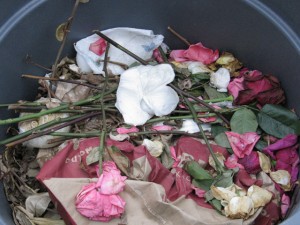Posted by Aimee | Posted in Compost | Posted on 16-04-2009
Tags: Compost, compost pile, containers, kitchen scraps, micro organisms, soil
A lot of the vegetables I want to grow are heavy feeders, potatoes for example. So even with tax season looming ahead of me I started composting. It is a fantastic, easy first step towards getting a garden going, and does not require any real sort of time investment. Otherwise, all those kitchen scraps and shrub clippings go to waste. Often into a landfill where they do little more than attract unwanted bugs.
There are a lot of ways to handle composting and as long as you do it right it will not smell. Ants can be attracted to compost, so you may want to keep an eye on that. As long as the ants do not bother you, they are beneficial to the compost by aerating it. If you happen to have an unused corner of your yard you can turn it into a compost pile, or you can use bins or containers of your own making and there is a plethora of bins available at places like home depot or online. A couple examples include Tumbleweed Composter, Mantis Twin Composting Bin or Earthmaker Aerobic Composter – 120 Gallon.
To start out with, think about how quickly you want your compost ready and how much effort you are willing to put into it. If you just take your kitchen scraps and yard cuttings and toss them in a pile they will over time break down. Keeping it covered lightly with soil will help to keep insect numbers down somewhat and to prevent foul odors. This method is the slowest and least efficient method and also requires almost no work. The micro-organisms will eventually break down the material and you will get compost. This type of compost will consistently be at the bottom of the pile.
To speed things up a bit add a bit of air and keep your compost pile moist (not soaked). Adding air is as easy as turning the compost regularly, a lot of retail bins make that as easy as turning a handle. In our case we put the trash can lid on and roll the bin around the yard. It also helps to keep greens and browns about equal. Browns are things like sawdust, hay, leaves, wood chips or branches. Greens are lawn clippings, fruits and vegetables.
You can also help the process by not trying to compost meat, dairy or fat. These ingredients in small dosages are ok, but can attract dogs, cats or even raccoons. If you are looking to make a small first step towards starting a garden, composting is your best option. It requires no money to start and it can create the richest soil available for your fruits, vegetables, flower and plants. Many plants would thrive without the need for any fertilizer at all if grown in pure compost. So far I have been thrilled with what compost we have created, I have even taken dead roses and flowers home from ladies at the office and tossed them into the compost. Compost is the present that just keeps on giving, as you add compost to your soil it will improve the soil structure overall and provide your plants with nutrients. Compostable materials are estimated to be approximately 30% of household wastes. Also commercially available compost may not be of a high quality. Often saw dust or wood chips are used as filler, these can actually tie up nutrients plants need if in large enough quantities.
A basic list of what is not compostable is:
- Meat, dairy and fatty wastes
- Diseased plants or problem weeds
- Human or pet wastes
- Anything that may contain chemicals or has been chemically treated
When I get more time I will compile a complete guide to composting.
An excellent source of more information is: http://www.vegweb.com/composting

